

Family-centered practices involve family decision-making
and action that honors and respects family choices, preferences, and desires.
Dunst et al, 2007
The family-centred philosophy has developed from ecological theory (Bronfenbrenner, 1979), help-giving and empowerment (see Dempsey and Keen, 2008). Effective family services promote family partnership, collaboration, affirmation and respect (Dempsey and Keen, 2008).
Many influential models of family service provision (e.g. Dunst, 2007; Guralnick, 2001) have emerged through developments in early childhood intervention.
In addition to early childhood, special and general education, the above tenets of family provision are widely adopted in health and therapy services (Dempsey and Keen, 2008).
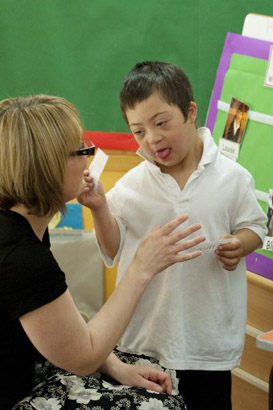
There are four crucial principles that underpin family-centered services:
- The family and not the professional is the constant in the child's life.
- The family is in the best position to determine the needs and well-being of the child.
- The child is best helped by also helping the family within the context of their community.
- The professional has a responsibility to enhance family choice, and to support their control over the services they desire.
(Dempsey and Keen, 2008)

Evolving models of partnership with families have led to the understanding of families as part of a dynamic system.
In the last 20 years, practice perspectives have moved radically from:
- Seeing families as insular to families as integrated within a social context.
- Being professionally controlling to family centred.
- Being solely child-focused to family-focused.
- Promoting simple linear intervention models to complex transactional ones.
- Multidisciplinary working to interdisciplinary working.
- Segregated centre-based services to inclusive community-based services.
(Moore, 2005)
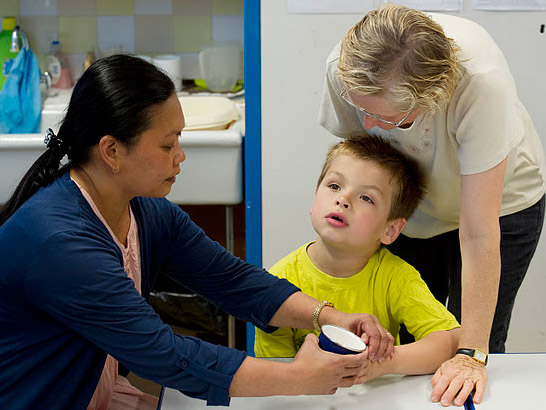
Read this article to find out about the currently emerging trends in working with families in early intervention.
How could these trends be developed in your school?
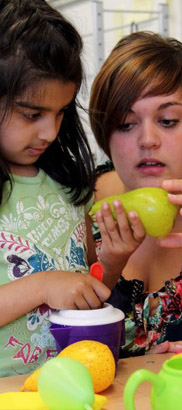
There is now also a greater understanding of the features of successful and unsuccessful provision.

The way in which professionals support children with
disabilities and their families has the potential to enhance or to impede child and family outcomes. Currently, family systems
theory underpins many models of service delivery that recognize the interrelatedness of family members and the importance
of acknowledging the needs of all family members, not just those of the family member with a disability.
Dempsey and Keen, 2008

Consider the following list of factors affecting the success of family service provision. For each factor, note whether you think it will lead to greater family empowerment or additional stress for families:
- High family socioeconomic status.
- High perception of own ability to influence events.
- High level of severity of son/daughter's disability.
- Family-centred, help-giving practices.
- Increased hours of contact from professionals.
- Increased intensity of services provided to the child or young person.
Compare your answers with this list based upon Dunst et al, 2007.
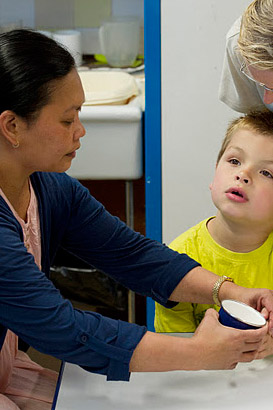

Higher levels of parent participation were always found
in family-centered services.
(Carpenter and Egerton, 2005; Hutchinson, 2005)
Sensitive interactions between families and professionals are crucial if the family is to be allowed to make its contribution in the ever-changing, uncharted scenario of their child's development. We will need to be creative in the strategies we employ to ensure family involvement in our services (Carpenter and Egerton, 2005; Hutchinson, 2005).
Dunst et al's (2002) framework encourages us to consider the implications for our practice of intervention outcomes for, and potential contributions of, all family members including 'significant others'.
Using Dunst et al's model, consider the following questions:
- What are the practice characteristics of a particular intervention you have carried out with a family?
- What were the outcomes for the child, parent, family?
- What were the practice consequences for you as a professional?
What changes would you make in the future?


Bronfenbrenner, U. (1979) Ecology of Human Development, Cambridge, MA: Harvard University Press.
Carpenter, B. and Egerton, J. (eds) (2005) Early Childhood Intervention: International perspectives, national initiative and regional practice, Coventry: West Midlands SEN Regional Partnership.
Dempsey, I. and Keen, D. (2008) A review of processes and outcomes in family-centered services for children with a disability, Topics in Early Childhood Special Education, 28 (1), 42-52.
Dunst, C.J., Hamby, D.W. and Brookfield, J. (2007) Modeling the effects of early childhood intervention variables on parent and family well-being, Journal of Applied Quantitative Methods, 2 (3), 268-288.

Dunst, C.J., Trivette, C.M. and Cutspec, P.A. (2002) Toward an operational definition of evidence-based Practice, Centerscope: Evidence-based approaches in early childhood development, 1 (1), 1-10.
Guralnick, M.J. (2001) A developmental systems model for early intervention, Infants and Young Children, 14 (2), 1-18.
Hutchinson, J. (2005) Early intervention for autism in Coventry. In: Carpenter, B. and Egerton, J. (eds) (2005) Early Childhood Intervention: International perspectives, national initiative and regional practice, Coventry: West Midlands SEN Regional Partnership.
Moore, T. (2005) Evolution of early childhood intervention practice, Presentation to the ECIA (VC) Consultative Forum, 'Moving towards outcomes in early childhood intervention - how do we do this?' (14 October).